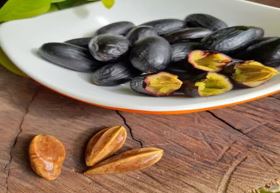Proximate Composition, Storage Stability, and Sensory Properties of Table Spread Produced from African Elemi (Canarium schweinfurthii)
DOI:
https://doi.org/10.54117/iajnfms.v2i1.56Keywords:
African elemi pear, Table spread, Storage stability, Guar gumAbstract
The proximate composition, storage stability and sensory properties of table spread produced from African elemi pear was evaluated. The fully ripened African elemi pear were purchased from a local market in Obolo, Enugu State, Nigeria and used in the production of table spread with varying quantity of guar gum- 0.5g (sample B), 1.0g (sample C) and 1.5g (sample D). African elemi pear produced without guar gum addition served as the control (sample A). Proximate composition results showed that moisture content of the table spread ranged from 51.69-54.25%, Ash content of the spreads ranged from 2.48-2.60%. Fat content of the samples ranged from 8.80-10.80%, Crude protein content ranged from 1.75-3.50%. Carbohydrate content of the samples ranged from 21.24-25.92%. There was significant difference (p<0.05) between samples in their moisture, fat, crude protein and carbohydrate contents. The initial free fatty acid (FFA) values of African elemi spread ranged from 3.91-5.73%. The African elemi pear spread during shelf storage at weeks 1 and 2, recorded FFA values ranging from 5.43-6.05% and 6.50-7.15% respectively, and ranged from 6.48-7.7.68% at week 3. At the end of the 4th week, the FFA value ranged from 7.35-8.15%. The initial peroxide value (PV) of the samples ranged from 4.49-8.98 mEq/kg. At weeks 1 and 2, the PV were observed to range from 5.43-10.65 mEq/kg and 5.50-9.60 mEq/kg respectively. At week 3, the PV ranged from 7.33-15.52 mEq/kg, and ranged from 8.27-19.74 mEq/kg at the end of the 4th week. Mean sensory scores of the table spread showed overall acceptability of the spreads ranging from 6.38-7.33, and there was significant difference (p<0.05) between samples. Microbial analysis result showed that the total bacterial and mould counts increased with storage. By week 3, the samples were above the 105 bacterial count for ready-to-eat foods. This study have shown that the incorporation of guar gumim the preparation of African elemi spread decreased the moisture and fat content while increasing ash, crude protein and carbohydrate contents. This study therefore demonstrates the potential of African elemi for the production of healthy spread as well as the use of guar gum in improving the quality of the spread.

Downloads
Published
How to Cite
Issue
Section
License
Copyright (c) 2024 Catherine Achese Orisa, Allbright Ovuchimeru Amadi, Ifeoma Comfort Onyechege, Ruth Nwerenma Owunna

This work is licensed under a Creative Commons Attribution 4.0 International License.
